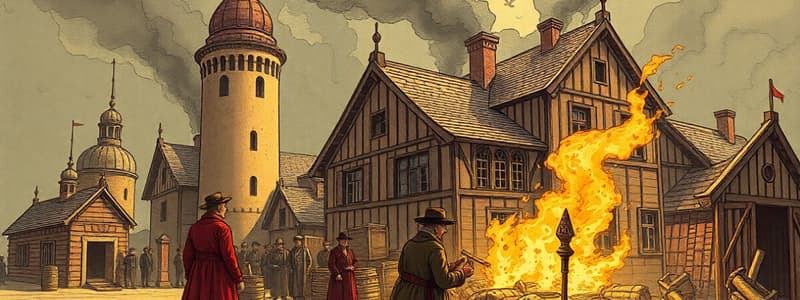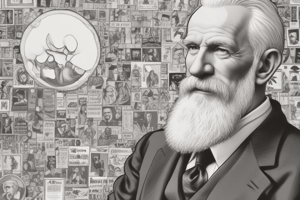Podcast
Questions and Answers
Who established the cooperative community known as New Harmony?
Who established the cooperative community known as New Harmony?
- Louis Blanc
- Friedrich Engels
- Robert Owen (correct)
- Karl Marx
Socialists believed that private property was beneficial for society.
Socialists believed that private property was beneficial for society.
False (B)
What did Karl Marx and Friedrich Engels advocate for in terms of property ownership?
What did Karl Marx and Friedrich Engels advocate for in terms of property ownership?
The abolition of private property and establishment of a system where all property is socially controlled.
Louis Blanc advocated for __________ co-operatives where profits are distributed based on work contributions.
Louis Blanc advocated for __________ co-operatives where profits are distributed based on work contributions.
Match the following socialist figures with their primary contributions or ideas:
Match the following socialist figures with their primary contributions or ideas:
Flashcards
Socialism
Socialism
A political and economic ideology that envisions a society where private property is abolished and the means of production are collectively owned and controlled by the people.
Socialist View on Private Property
Socialist View on Private Property
A view that the ownership of private property is the root of social inequality and exploitation, leading to the suffering of the working class.
Cooperative Communities
Cooperative Communities
A type of socialist community where members work together, share profits, and make decisions democratically.
Government Intervention in Socialism
Government Intervention in Socialism
Signup and view all the flashcards
Marxist Theory
Marxist Theory
Signup and view all the flashcards
Study Notes
The Coming of Socialism to Europe
- Socialism emerged as a prominent ideology in mid-19th century Europe, challenging the prevailing capitalist system.
- Key criticism of capitalism revolved around private property ownership, viewed as the root of social ills. Those with property prioritized profit over worker welfare.
- Socialists advocated for collective social interests over individual gain.
- Alternative visions for society included cooperatives, aiming for collective ownership and shared profits, rather than sole ownership by private individuals.
- Robert Owen, a prominent example, sought to establish a cooperative community (New Harmony, Indiana).
- Louis Blanc, another advocate, proposed government support for cooperatives to replace capitalist enterprises.
- Karl Marx and Friedrich Engels argued that capitalism's inherent exploitation of workers necessitates revolutionary overthrow to achieve a communist society.
- Their analysis underscored that the profit of capitalists was produced by workers, but the wealth accrued remained with the capitalists.
- This would lead to a collective ownership of the means of production and a more equitable distribution of wealth, also known as communism.
- Marx was convinced this worker-led revolution was inevitable.
Studying That Suits You
Use AI to generate personalized quizzes and flashcards to suit your learning preferences.
Description
Explore the emergence of socialism as a significant ideology in mid-19th century Europe, challenging capitalism. Learn about key figures like Robert Owen and Karl Marx, their critiques of capitalism, and alternative societal visions such as cooperatives. This quiz delves into the foundational ideas that shaped socialist movements during this pivotal era.




